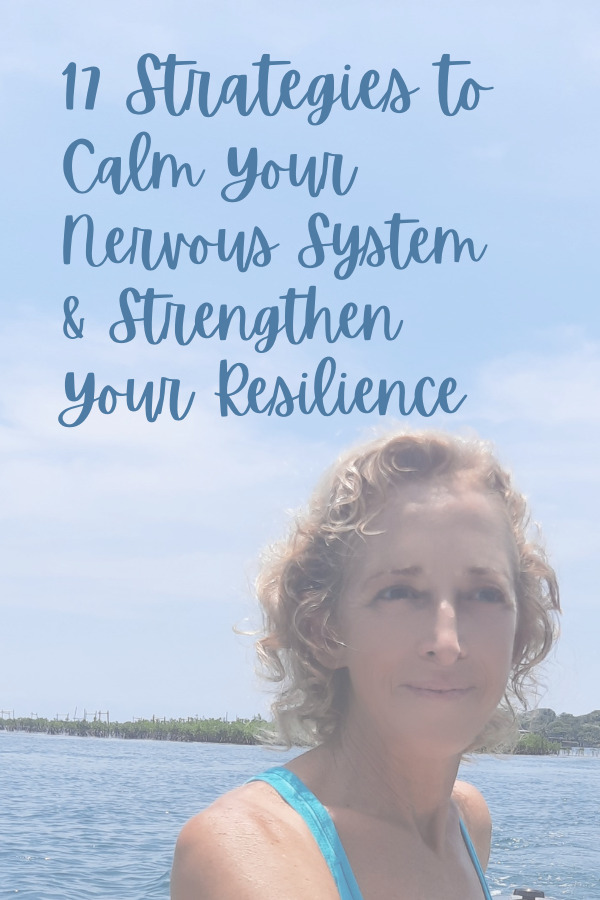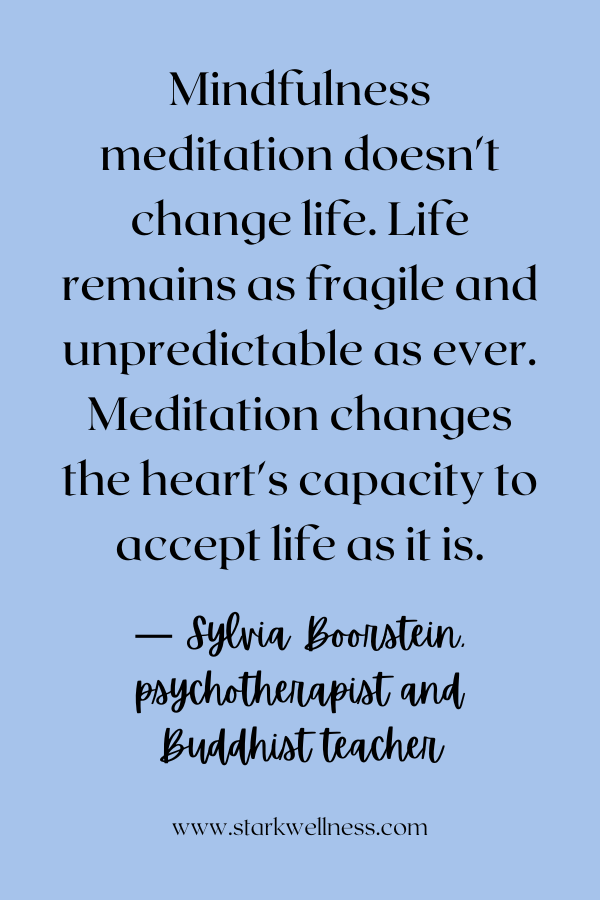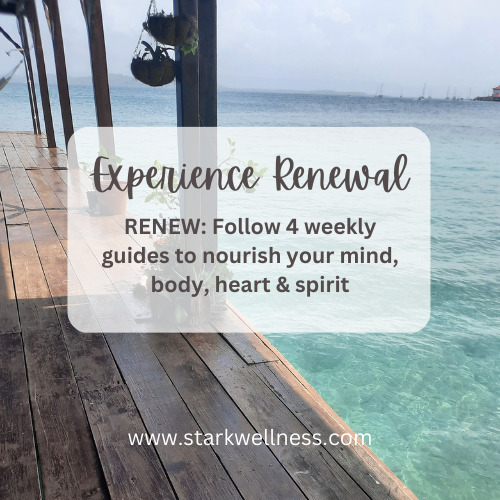Feeling overwhelmed lately?
How much are the challenges of daily life and a hectic world taxing your nerves?
Whether you’re home all day with little ones, careening from meeting to meeting, or out fighting fires, your nervous system is indeed being put to the test again and again in this world.
And you must go on, right?
I hear you, and I’ve got you.
Here are 17 practices to help you regulate your nervous system so you can recover from stress and thrive in your life.

1. Breath through your nose more often.
In addition to filtering toxins, nose breathing tends to be slower, and that slowed breathing sends signals to your body to relax. Be mindful throughout the day and night to keep your mouth closed and only open for talking or eating.
2. Breathe deeply.
Practicing these first two strategies in tandem will effectively stimulate your vagus nerve and activate your parasympathetic nervous system. You’ll swoon yourself into a more restful state. Feel that breath go way down into your belly before you release it. The more deliberate you are about this, the more it will become a habit.
3. Sit and stand tall.
Maintaining good posture will help you get those breaths way down into your belly. When you slouch you shortchange your air supply and the circulation of oxygen in your body. Pretend you’re being lifted by a string overhead. Even when you rest you can lean back in a chair still somewhat erect or lay your head down on your desk far enough forward that your back doesn’t round much.
4. Learn new things in bite-sized pieces, set baby-step goals, and implement before going on.
This is soooo hard for me! Can you relate? I love, love, love learning….growth is one of my core needs. But I can easily whirl into information overload and suddenly feel stressed about something I was first excited about. Implementing steps successfully, or mastering something even if it’s small, boosts self-worth, releases feel-good hormones, and slows the information highway in your head. All of these factors help to balance the nervous system. So, remember — bite-sized chunks + baby-step goals + bits of action.
Related Reading: “Your Guide to Supercharged Goal Setting”
5. Do one thing at a time.
It’s great to talk to a friend while you walk outdoors or listen to music while you do chores, but leaving unfinished business all over the place will only induce stress and trigger stress responses in your body. Write out all the things you want to do, then categorize and prioritize. Use weekly and daily lists with no more than 3-5 things to do per day. Commit to your lists and learn to start trusting yourself and trusting that you will do all you need to do. Reward yourself for EACH thing completed. Get help if there’s too much, or consider what you can simply cross off. You’ll feel so much better.
6. Give yourself real breaks.
Enjoy lunch without a screen, coffee away from your desk, a stretch outside in the breeze. Additionally take a little time each day to sit in a quiet place and just breath deeply and relish in the stillness. Meditate if you want, or practice mindfulness and take in all the sights, sounds, smells, and textures of things surrounding you. Savor the lunch or the coffee. These mindfulness practices will help you really take a break from everything else. Your nervous system needs frequent breaks from all the stimulation–so, offer that to yourself.
Related Reading: “Laid Back Mindfulness and Meditation” (one of my favorite posts)

7. Bring something to completion.
Don’t let loose ends and unfinished projects haunt you and trigger anxiety or that “Ugh, I’ve got so much to do!” feeling. Aim for good enough if perfectionism plagues you. Find an accountability partner if you tend to procrastinate. Celebrate a win and plan for the next one (remember #5). Completion could also mean stopping and letting it go so you can focus on more meaningful endeavors.
8. Sit in some sunlight every morning.
If it’s too cold outside, sit in a window. Purchase a sun lamp if needed. 20 minutes will get your circadian rhythm in check and help your body start the day with relaxed alertness. You’ll likely sleep better, too. Double win for resiliency!
9. Darken your bedroom at bedtime.
Black out your windows. Completely shut down your phone or put it in another room. Wear an eye mask. Keep a flashlight by your bed in case you need to get up for some reason. Even the tiniest light could disrupt your sleep; that disruption could be brief if you’re lucky, or it could lead to a whole night of restlessness….which could lead to a whole day of disregulated nervous system reactions. Don’t underestimate the negative effects of even a tiny on/off power light.
10. Declutter.
Especially declutter your bedroom, then move on to your kitchen, your home screen, your messages and emails. How do you feel when you walk into a spa or a nice lobby or hotel room with minimal furnishings and decor? See how you can gift yourself pleasant sensory experiences in the places in which you spend the most time and eliminate drudgery.
11. Stick to regular meal and snack times.
Give your digestive, nervous and hormonal systems relief and assurance that you will be well fed in a timely manner. There will be no hangry moods nor any need for your body to fear starvation and hold onto extra fat. Steady blood sugar will help you stay steady as well.
12. Stop eating two hours before bedtime.
Give your digestive system and organs ample opportunity to perform their magical overnight detoxification and cell recovery processes. You’ll maintain that circadium rhythm balance and allow your body to get true rest.
13. Avoid screen-time overload.
Definitely put boundaries around night-time use. Take long breaks during the day. If you think the warnings about electronics being overstimulating and inducing stress, irritability, anger, depression and even suicide are just myths, read this article from Potsdam State University of New York titled “What Does Screen Time Do to My Brain”. I’m itching to read the book mentioned. Be super careful about excessive social media scrolling, especially if you are prone to comparisonitis. And gaming can actually have some positive mental effects, but it becomes unhealthy after prolonged periods.
14. Focus on solutions and taking action.
We all like to vent, and it’s often very helpful to share a disheartening experience and have someone else in the world know your pain. Continuing to complain about the same thing to multiple people, or in your own head, keeps your nervous system on alert about it instead of relaxing about it because you found a way to solve your problem or overcome it. It’s natural to want to know how others might approach problems, but too many inquiries can keep you in a loop of asking and not acting. Be selective about who you vent with–only people who have your best interests at heart and will help you brainstorm solutions.
15. Build self-confidence.
Become so secure in yourself that you don’t fret over what other people might think or say.
“Low self-confidence isn’t a life sentence. Self-confidence can be learned, practiced, and mastered–just like any other skill. Once you master it, everything in your life will change for the better.” — Barrie Davenport, life passion coach.
16. Stick to your supporters.
Who gets you? Who understands, respects and supports you? The more time you spend with those fantastic people, the more you’ll keep your nervous system in a balanced state. You’re probably helping them do the same.
17. Redirect fear.
Become well-informed and cognizant when you need to, and learn to trust your intuition. Most of all become confident that you will be okay (resilient!) and will figure things out even if something goes badly. Don’t sit in fear and let it hold you back and trigger even more stress about sitting in fear.
Do any of these resonate? You’re not alone. I’ve been guilty of letting stress and anxiety get the best of me, and I know that rings true for MANY others.
These strategies can make a difference.
- Start being more mindful about your stress and anxiety levels and what drains your nervous system.
- Choose a strategy or two that applies to your most common triggers.
- Save this list so you can gradually create more and more positive habits for yourself.
The more balanced your nervous system is, the more resilient you’ll become, and the healthier and happier your life will be. Let this be your guide to become your own best self-healer.
And if you want even more help or strategies, you might love to know about my email course RENEW. It will help you discover simple and easy-to-implement solutions to dramatically REDUCE STRESS, IMPROVE YOUR MOOD, and BALANCE YOUR BODY AND SPIRIT in just minutes per day. Find out about RENEW here:

You might also like to read: “A Call for Self-Care and 4 Solutions”

Hi! I’m Jennifer, your life, love and wellness coach! I help men, women and couples figure out what’s keeping them from being happy and healthy so they can overcome those blocks and determine and implement steps to truly improve their lives, relationships, and physical and mental health. I’m a certified Professional Life Coach and Holistic Health Coach with a background in professional counseling. I’m ready to help you. jennifer@starkwellness.com
Leave a Reply